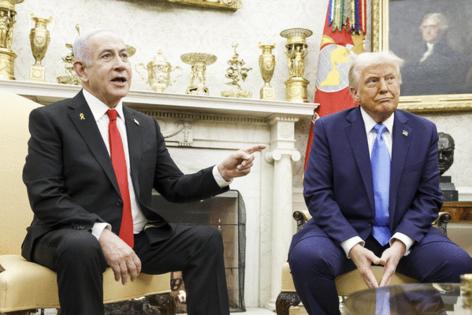Trump's tariff stance set for test in meeting with Israel's Netanyahu
Published in News & Features
Israeli Prime Minister Benjamin Netanyahu’s meeting with Donald Trump will give world leaders a sense of how willing the U.S. president is to budge on tariffs.
Netanyahu made a sudden visit to Washington on Sunday and immediately went to see U.S. Commerce Secretary Howard Lutnick. The prime minister gave few details, beyond saying their talks were productive.
Later on Monday, he’ll become the first foreign leader to meet Trump since the U.S. outlined new levies for almost all countries. While Netanyahu wants to discuss Iran and the war in Gaza, he’s made clear that getting a better deal on tariffs is key.
Israeli officials were shocked when Trump unveiled a 17% levy on the country’s goods last week. That made Israel one of the hardest-hit nations in the Middle East, despite Netanyahu’s closeness to Trump and it being the U.S.’s main ally in the region. The move also came after Israel had said, just a day earlier, it would cancel customs duties on American products.
Netanyahu said he would talk to Trump about “the tariff regime that has been imposed on Israel.”
“I hope that I will be able to help on this issue,” he said, describing it as “so important to the Israeli economy.”
Israeli assets — like those around the world — are coming under pressure. The shekel is heading for its worst two-day performance since just after Hamas’ attack in October 2023. The government’s credit-default swaps — a gauge of a country’s risk premium — have surged to their highest level in several months.
It’s unclear what Netanyahu can offer Trump. The White House has shown few signs of flexibility with any country, despite more than 50 calling the administration seeking negotiations, according to U.S. Treasury Secretary Scott Bessent.
Israel’s main problem is its trade surplus with the U.S. At $7.4 billion last year, it’s the biggest any Middle Eastern nation has with America and is even larger if Israel’s tech-software exports are included.
“This is not a negotiation, this is a national emergency based on a trade deficit that’s gotten out of control,” White House trade czar Peter Navarro said to Fox News on Sunday, referring to U.S. deficits in general. Still, he said, “we’re always willing to listen.”
©2025 Bloomberg L.P. Visit bloomberg.com. Distributed by Tribune Content Agency, LLC.







Comments